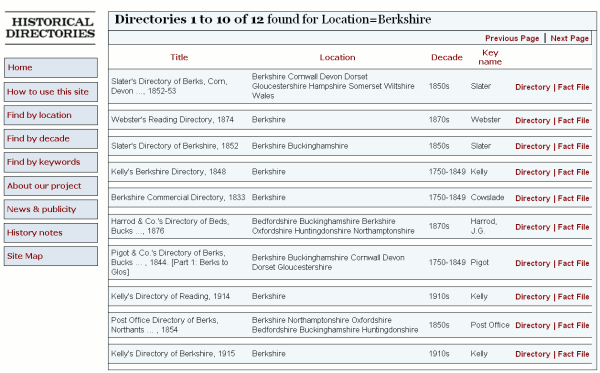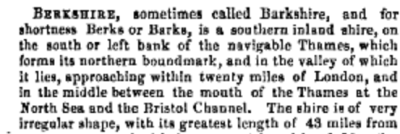Someone has just contacted me via Facebook asking how they could track down a company in London. Not a difficult piece of research you might say but the time period was the 1890s!
One resource that immediately sprang to mind was the Historical Directories at http://www.historicaldirectories.org/. This is a digital library, maintained by the University of Leicester, of local and trade directories for England and Wales, from 1750 to 1919. It does not attempt to publish every directory available between 1750 and 1919 but what they do have makes fascinating reading.
I first reviewed it in July 2004 and my initial interest was on the business side as I am sometimes asked how to find information on small, local companies going back 50 to 100 years. I quickly discovered, though, that for my own location (Caversham in Berkshire) the Kelly’s directories for 1914 and 1915 included residential listings. I ended up spending hours researching who had lived in my house, who the neighbours had been and their occupations.
There are several search options including a keywords option that lets you search by any combination of location, decade, key name (directory name e.g. Kelly), your own keywords, and with fuzzy logic on or off (off is the default). For my own searches I found it easier to identify directories in my location and then search them individually, but one of the alternative search options may suit you better. For Berkshire I found Kelly’s, Slater’s and Webster’s directories and there is a “Post Office” directory for Berkshire, Northamptonshire, Oxfordshire, Bedfordshire, Buckinghamshire and Huntingdonshire for 1854!

For each directory there is a Fact File containing bibliographic information and links to the main chapter headings. When you view the pages that match your search criteria your search terms are highlighted.
The site also supports seriously advanced search options (see http://www.historicaldirectories.org/hd/howto/howto7.asp#detailed for details). For a phrase just type in the words next to one another, for example Star Road. If, on the other hand, you are looking for a person their name may appear as surname, middle name(s), first name. For this type of search there is a “within” operator, for example George w/3 Bloggs will look for George within three words of Bloggs in any order. The wildcard is a question mark (?) and replaces a single character. The asterisk replaces 0 or more characters. Wildcards can be used at the beginning, in the middle or at the end of a word.
For information on who was hitting the headlines in your town in the 1890s you could try the recently launched British Newspapers 1800-1900 at http://newspapers.bl.uk/blcs/. This covers two million pages of 49 local and national 19th century newspapers. There is a basic search option on the home page but the advanced search enable you to search by keyword, publication date(s), place of publication, section (e.g. people, business), publication frequency and language (English or Welsh).
The problems start with the publications that are covered – only 49. Nothing in Berkshire so this is a non-starter for my own local search. Note also that you have to pay to view most of the articles. A 24 hour pass costs £6.99 and allows you to view up to 100 articles. A seven day pass costs £9.99 and gives you 200 article views.
I could not find out what the buzz was in Reading and Caverhsam in the 1800s from the British Library newspaper archive (perhaps there wasn’t any!), but what do the directories have to say? According to the 1854 Post Office directory:

“BERKSHIRE, sometimes called Barkshire, and for shortness Berks or Barks, is a southern inland shire, on the south or left bank of the navigable Thames, which forms its northern boundmark, and in the valley of which it lies, approaching within twenty miles of London, and in the middle between the mouth of the Thames at the North Sea and the Bristol Channel. The shire is of very irregular shape…”
And who did live in my house in 1914/1915? Number 88 Star Road, or number 6 Webb’s Cottages as it then was, was home to Charles Herbert and his wife Mary who was a shopkeeper. Neighbours included a wheelwright, carpenter, window cleaner, builder, two pub landlords and an insurance agent. Apart from the wheelwright, not very different from today’s residents!

